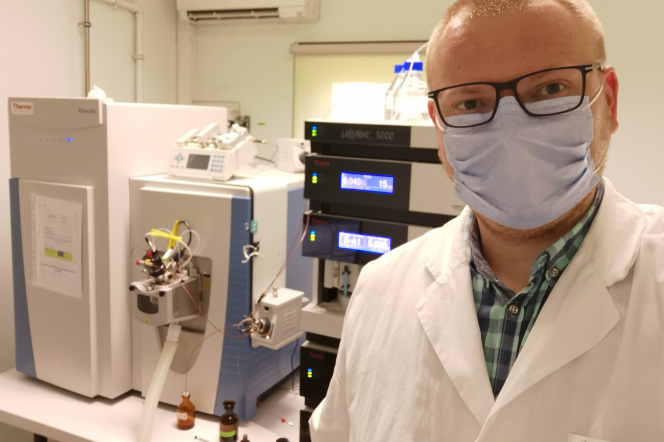Date added: 2021-09-14
Research visit in the framework of the Europium Short-Term Outgoing Visits programme

In the framework of the Europium Short-Term Outgoing Visits program, Dr Karol Parchem from the Department of Chemistry, Technology and Biotechnology of Food of the Faculty of Chemistry received a scholarship for a 4-week research visit in the Mass Spectrometry Center of the University of Aveiro (UA) in Portugal, led by Professor Rosário Domingues. For over 25 years, the Mass Spectrometry Center UA has been conducting research in the field of functional biochemistry as well as research on the application of omics techniques in food sciences, nutrition and medicine. The current research topics of the Center include the search for new biomarkers of oxidative stress in pathological conditions such as diabetes and cancers as well as the determination of the biological significance of post-translational modifications of proteins under conditions of cellular oxidative stress.
As part of the visit, Dr Karol Parchem carried out research on the effect of heme iron present in food on the induction of oxidative stress in the human gastrointestinal tract. Epidemiological studies have revealed the link between the consumption of red meat, which is a rich source of heme iron, and the development of colorectal cancer. Moreover, in 2015, the International Agency for Research on Cancer (IARC) classified the consumption of red meat as a probable carcinogenic factor for humans (group 2A), and the consumption of processed meat as a carcinogenic factor (group 1). It is believed that one of components responsible for the carcinogenicity of red meat is heme iron. However, the mechanism of its action has not been not fully understood yet. It is proposed that one of them may be the induction of lipid oxidation during the gastrointestinal digestion stage.
The research carried out during the visit was aimed at the identification of reactive lipid species resulting from heme iron-catalyzed oxidation under gastrointestinal conditions, using ultra-performance liquid chromatography coupled with mass spectrometry technique. In addition, the visit made it possible to enrich the Applicant's experience in handling a high-resolution mass spectrometer equipped with an Orbitrap analyzer and processing the obtained data using appropriate software.
Collaboration with the team led by Professor Rosário Domingues is currently continued under the COST Action (European Cooperation in Science and Technology) entitled "Pan-European Network in Lipidomics and EpiLipidomics", in which Poland is represented, among others, by employees of the Faculty of Chemistry of the Gdańsk University of Technology, Professor Agnieszka Bartoszek and Dr Karol Parchem.
More information about the COST CA19105 EpiLipidNET Action is available on the following website: https://www.epilipid.net.

